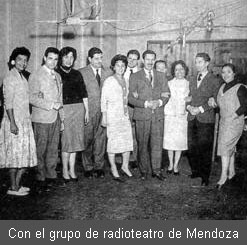|
BIOGRAPHY POLITTI, LUIS (Luis Politi). Actor. Luis Politti was born in the province of Mendoza, in Argentina, on April 8, 1933. While completing high school, he studied the piano, trumpet, and contrabass at the School of Music at the Universidad Nacional de Cuyo in Mendoza. Politti also harbored a rising interest in acting, which prompted the director of the School of Music to recommend him to Galina Tolmacheva – the noteworthy professor of dramatic arts and former student of both Konstantin Stanislavsky and his beloved disciple, Fedor Komisarjévsky. Politti would go on to study under her for four years at the School of Dramatic Arts at the Universidad Nacional de Cuyo. In 1966, he traveled to Buenos Aires, Argentina’s capital, on scholarship from the country’s National Art Fund. Shortly after his arrival, Pedro Escudero added him to the cast of Rolf Hochhuth’s "El vicario" and not long after that, he made his television debut with a small role in "Las tres caras de Malvina." Between 1968 and 1973, he acted with the full-time cast of the General San Martín Municipal Theater. There he demonstrated his worth in stage productions like Ramón del Valle Inclán’s "La cabeza del dragon" and "Romance de lobos"; Witold Gombrowicz’s "Yvonne, Princess of Burgandy"; Shakespeare’s "Macbeth"; and Leopoldo Marechal’s "Antígona Vález", to name just a few of the eleven he appeared in during that time.
His made his entrance into Argentine cinema with "Turismo de carretera" (Rodolfo Kuhn, 1968). Later, he stood out as the verbose Vignale in "La tregua" (Sergio Renán, 1974); the provincial doctor in "Boquitas pintadas" (Leopoldo Torre Nilsson, 1974); the cattle herder Remigio Calamaco in "Los gauchos judíos" (Juan José Jusid, 1975), which won him the prize for Best Actor, awarded that year by New York association of Latin Press; and the desperate father in "No toquen a la nena" (Jusid, 1976). His further participation in Argentine film included: "Los traidores" (Raymundo Gleyzer, 1971-2), which was never commercially released; "Luces de mis zapatos" (Luis Puenzo, 1973); "Los golpes bajos" (Mario Sábato, 1974); "La Raulito" (Lautaro Murúa, 1975); "La Guerra del cerdo" (Torre Nilsson, 1975); "Solamente ella" (Lucas Demare, 1975); "La película" (José María Paolantonio, 1975); and "Tiempos duros para Drácula" (Jorge Darnell, 1975), a co-production with Spain which was never released in Argentina. The political events that took place in Argentina starting in March 1976 would lead to the actor’s exile in Mexico. Then, difficult circumstances due to his immigrant status in Mexico would keep him from continuing his career there. But thanks to help from Lautaro Murúa, Politti was able to proceed with his work in Spain, where, when he arrived, he was quickly recognized for his undeniable talent as an actor. His accomplishments in Spanish film include: "Las truchas" (José Luis García Sánchez, 1977); "La escopeta nacional" (Luis García Berlanga, 1977); "Hierba salvaje" (Luis María Delgado); "Con uñas y dientes" (Paulino Viota, 1978); "El corazón del bosque" (Manuel Gutiérrez Aragón, 1978); "Tierra de rastrojos" (Antonio Gonzalo, 1978); "F.E.N." [Formación del Espíritu Nacional] (Antonio Hernández, 1978); "Cuentos eróticos" (episode: La Tilita, directed by Josefina Molina, 1979); "Sus años dorados" (Emilio Martínez-Lázaro, 1980); "El hombre de moda" (Fernando Méndez-Leite, 1980); "Dedicatoria" (Jaime Chavarri, 1980); and "El nido" (Jaime de Armiñan, 1980), where he did an excellent job in a memorable acting duo next to Héctor Alterio.
Complications arising from a poorly treated hepatitis culminated in Politti’s sudden death in the Nuestra Señora de la Concepción Clinic in Madrid on July 14, 1980. However, more than a few of his Argentine companions, also residents in Madrid at that time, insist that the actor died of sadness due to his forced exile from Argentina. In the book "Héctor Alterio", author Hugo Paredero, leading actor in "The Official Story", refers to the death. "How did he die?" the author asks. "They say he died of a badly treated hepatitis, but if he had come down with that hepatitis, or whatever he had, in Argentina, I am quite sure Politti would not have died. He gave up. Here you treat a headache with an aspirin, but a headache over there could turn into a tumor. Maybe it wasn’t like that, but it seems to me that some of that distress he suffered led to his death." His sole performance in Spanish theater took place in April 1980, right before his death, in the María Guerrero National Dramatic Arts Center in Madrid. The production was "Motín de brujas", by the Catalan Josep María Benet, and Politti acted alongside a premiere cast including Carmen Maura, Marisa Paredes, Julieta Serrano and María Asquerino. A short time after his death, Asquerino published an open letter to the actor in Madrid’s newspaper El País. The letter, a touching, fraternal synthesis of the feelings that Politti awakened in his Spanish colleagues, concluded with the words, "Why have you left us so early, dear soul companion? I know that in another place, in another moment, someday, we will once again do a play or film together. I am sure it won’t be long." Taken from "De Gardel a Norma Aleandro:
diccionario sobre figuras del cine argentino
|
|
Home
|
Artistic Training |
Theater Mendoza |
Television in Mendoza |


 On
Spanish television Politti participated in Marco Denevi’s "Rosaura a las
diez"; José López Rubio’s "Esta noche, tampoco"; and Bernard Shaw’s
"Pygmalion", in which he did a brilliant performance as the drunkard
Alfred Doolittle, alongside co-star Marilina Ross and under José Antonio
Páramo’s direction (1979).
On
Spanish television Politti participated in Marco Denevi’s "Rosaura a las
diez"; José López Rubio’s "Esta noche, tampoco"; and Bernard Shaw’s
"Pygmalion", in which he did a brilliant performance as the drunkard
Alfred Doolittle, alongside co-star Marilina Ross and under José Antonio
Páramo’s direction (1979).